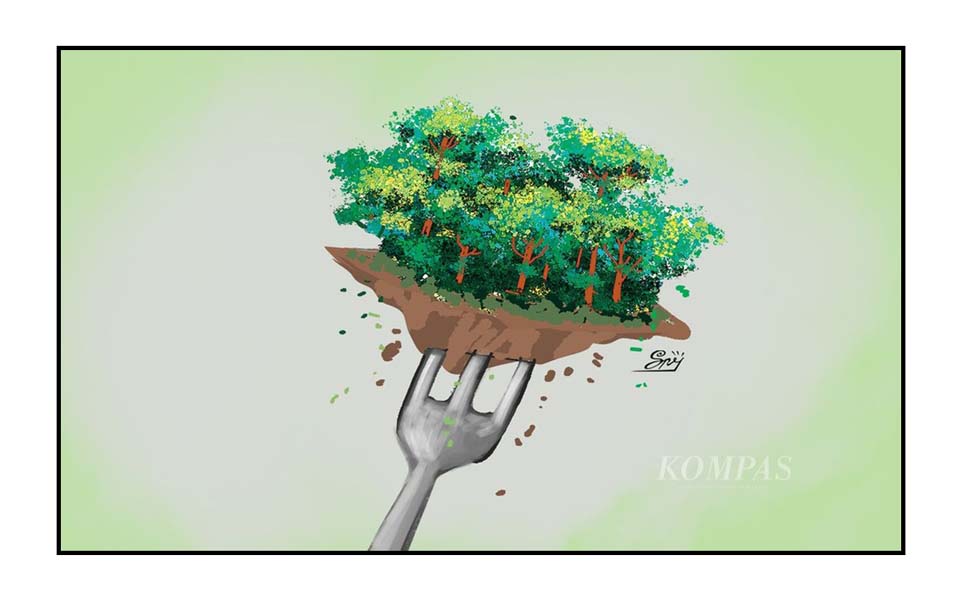
[From an oped piece in Kompas.id by Cenderawasih University anthropologist and Papua Research and Community service Foundation (LP2M-Papua) Chairperson Agust Wenehen titled "Natural Resource Corruption in Papua".]
Opposition to the food estate project by the Awyu tribe in the Ilwayab Wanam district of Merauke, South Papua, is just one example of the "defeat" of local residents when faced with the dominance of business people who are working hand in hand with the government.
The exploitation of natural resources (SDA) often results in environmental degradation, conflict and corruption.
The food estate project is a government endeavour to develop agriculture, plantations and livestock for national food availability.
Unfortunately, similar projects have yet to show any signs of success, although the Ministry of Agriculture claims that several food estate projects have been successful, such as in Gunung Mas, Central Kalimantan; in Central Sumba, East Nusa Tenggara; and in Keerom regency, Papua.
Conversely, there are several food estate projects that have not been successful or sustainable. For example, the development of 30,000 hectares of former peatland for national food availability in Central Kalimantan during the Covid-19 period in 2020.
The project was deemed a failure because it did not involve the local community and did not understand the needs and the socio-cultural and economic conditions of the community (masterplandesa.com, 4/6/2024).
Research Associate CORE Indonesia (Kompas.com, 24/1/2024) also reported that there were six failed food estate programs in Indonesia. Two of them are in Papua, namely the food estates in Merauke, such as the Merauke Integrated Food and Energy Estate (MIFEE) in 2008 with a land area of 1.23 million hectares and the Rice Estate covering 1.2 million hectares in 2015.
The food estates above were ambitious programs initiated by business people together with the government in managing natural resources which failed due to contradictory points of view and not involving community participation.
Indigenous Papuans interpret natural resources as identity or soul that is immanently correlated with infrastructure, value systems and social ties. Therefore, the connotation of land or forests, for example, is as a symbol of "mama". The context is as a place where "we are born, live, find food, and finally die".
Meanwhile, business people or the government seem to interpret their rights in formal legal construction of exploiting natural resources. Then, they ignore the existence of indigenous peoples' rights.
With such a manifestation of close reciprocal friendly relations, corruption is like the "unwritten rules of the game" played by business actors and state officials (Osburg, 2018). Through power, they design a sophisticated monopolistic system to support the network of corruption.
This kind of conflict of interests has led to the dominance of control by business actors together with ruling actors over natural resources. Indonesian Forum for the Environment (Walhi) research in 2022 showed that control of land and natural resources for mining, palm oil and forests by corporations in Indonesia has reached 94.8 percent (53 million hectares). Meanwhile, the ordinary people only control around 2.7 hectares.
Therefore, the public needs to be given an explanation of how corruption of natural resources due to the dominant grip of certain business people together with certain government officials using various methods can be prevented and eradicated if a strong commitment to anti-corruption is to be built.
The friendly and reciprocal relationship between business actors and government actors is built on mutual trust and influence. Each actor has a role and responsibility. Exchange becomes a symbol to bind, protect, and control common interests in the exploitation of natural resources.
This kind of “barter” practice occurs because of the monopoly over power, the freedom to act without supervision and the lack of accountability, as formulated by Robert Klitgaard in his book, Controlling Corruption (1988).
At this point, the corruption of natural resources is “legalised” and eventually becomes a pop culture trend because it is patterned and structured in a complex network and controlled by powerful actors in politics, law and business.
The dominance of natural resource management due to close relationships often has the potential for corruption. Indonesian Corruption Watch (ICW) reported that over the period 2010-2017 at least 326 people were declared suspects in natural resource corruption cases.
In Papua, a BBC report (September 16, 2022) found that in 2018 law enforcement officials named as many as 97 people suspects with state losses of 470.1 billion rupiah. Throughout 2021, as many as 33 people were declared suspects in corruption cases.
In a directive, Vice President Ma'ruf Amin said that it is necessary to have a joint resolve if Merauke is to be a national food barn in Eastern Indonesia. Therefore, there needs to be the involvement of stakeholders among the ranks of government officials and the community (Wapres.go.id, 30/11/2022).
The failure of the two previous food estate projects in Merauke can be used as a reflection and reference so the upcoming food projects do not suffer the same fate.
The Awyu tribe's rejection of the planned conversion of their customary forest land should not be seen in black and white. They are also Indonesian citizens who need a guarantee of legal certainty, who want to be recognised and their customary rights respected.
Their involvement in every stage and policy mechanisms from upstream to downstream are very much needed and must become part of the strategy of creating sustainable development.
This is important so that the Awyu tribe does not lose out in the contestation of interests in natural resource management. They need the power of input, encouragement and motivation in order to be part of a joint commitment to strengthen indigenous peoples, protect the environment and prevent corruption.
Source: https://www.kompas.id/baca/opini/2024/09/01/korupsi-sumber-daya-alam-papua




